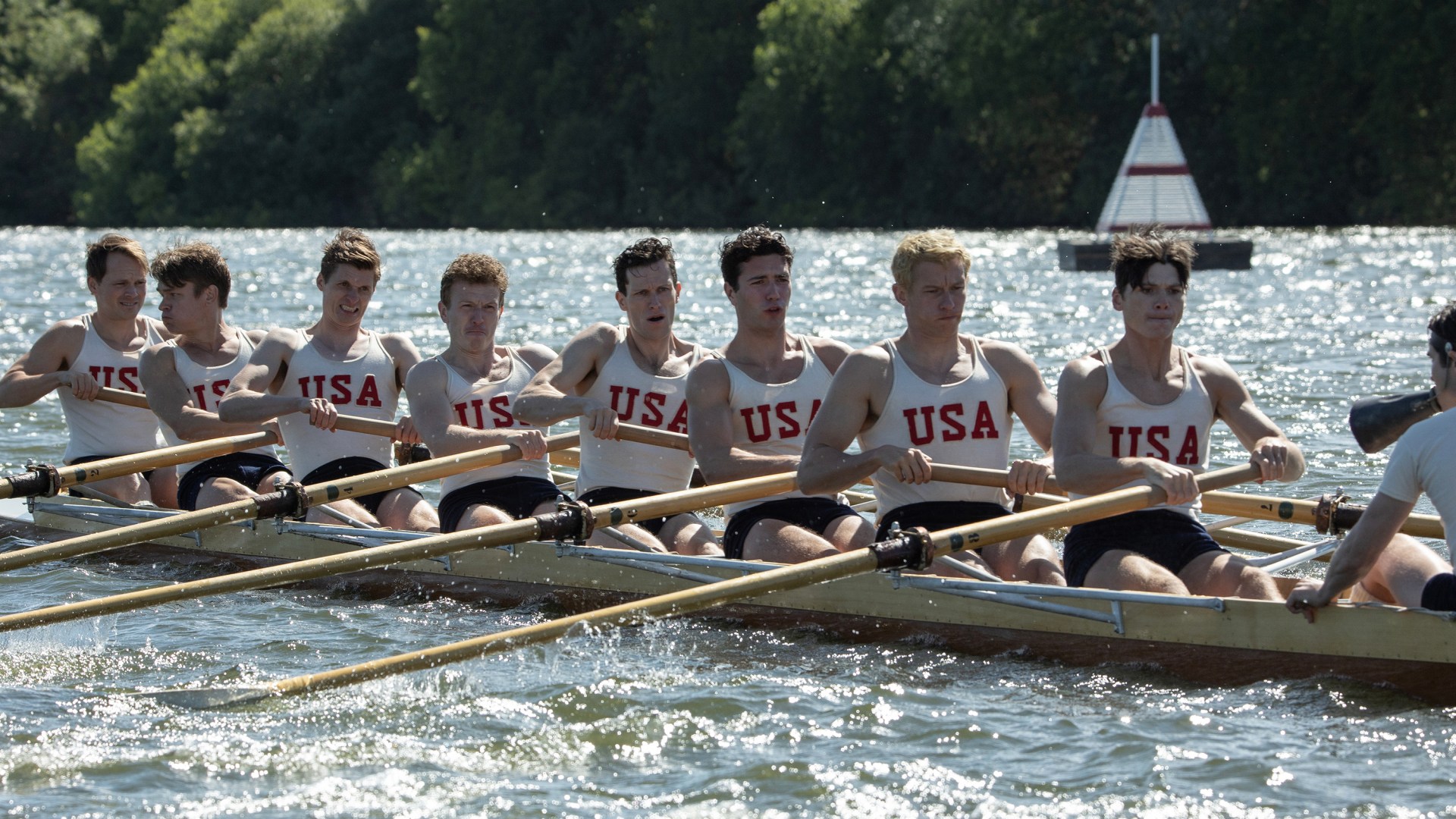With The Boys in the Boat, in theaters for Christmas, director George Clooney has made a flawless sports movie, telling the true story of a humble college rowing team that united Americans across class divides and the expanse of a great but troubled nation. Boys is nostalgic and grounded in history, but it speaks directly—and deliberately—to our time.
Things are hard in 1930s Washington State. The Great Depression rages, work is scarce, and hope is even scarcer. Young Joe Rantz (Callum Turner) struggles to keep himself fed as he studies at the University of Washington, sleeping at night in a wrecked car in a shantytown. By day he studies and pulls a shift at a factory—if he can get the work. When he hears that a position on the university crew team comes with a bed and a stipend, he grabs an oar.
Joe is not the only rower having a hard time making ends meet, and the crew must compete against much better-funded teams, teams with full bellies and trust funds. Harvard is a powerhouse, Yale a serious contender, and Cal-Berkeley the local rival. But something clicks in the Washington team as they start winning races, something that will eventually take them to the 1936 Olympics in Berlin. Along the way, they become a symbol of and for Americans: knocked down but ever rising again.
The movie is excellent, shot with loving attention to the sound of a blade slapping a wave, the heave of an oar, the poetry of a shell cutting through the water like a dagger. Turner plays Joe with quiet reserve, balanced by his lively love interest, Joyce (Hadley Robinson). Clooney, no stranger to vintage sports films after directing 2008’s Leatherheads, manages to make an austere and esoteric sport not just interesting but exciting.
But The Boys in the Boat, based on a 2013 book by the same name by Daniel James Brown, is never just a feel-good sports flick. The backdrop of the ongoing Depression, the Great War in the near past, and a new war on the horizon keeps national crisis perpetually in view. Part of Joe’s backstory involves his father (Alec Newman), a hard-bitten, affectionless man whose own childhood ended at 14 when war broke out in Europe. Joe must make his way in rough times, but he does so while understanding that his father had it worse.
For the audience, it’s Joe’s generation whose experience of hardship is now fading into memory. The generation that survived the Depression as adults is all but gone—the real Joe Rantz died in 2007 and would be approaching his 110th birthday were he alive today—and with them is dying many American families’ firsthand or even secondhand knowledge of what it feels like to work to the bone and still not be able to fill your stomach or put a roof over your head.
That degree of poverty is at most a hand-me-down memory for the majority of Americans alive today. Aside from recent immigrant and refugee arrivals, comparatively few of us have known real hunger. But The Boys in the Boat makes this suffering nearly tangible: You see the deprivation, can almost feel the cold, and know the burning frustration of being able and willing to work but unable to find a job.
The 1936 Summer Olympics were infamously hosted by Adolf Hitler in Nazi Berlin, the final Olympic games until after World War II. Boys’ depiction of the Nazis’ rising power and barely concealed lust for violence is chilling, not least because the audience knows what the characters do not: that in five short years, these boys, and millions like them, would be in the battlefields of Europe and the South Pacific.
Yet in the meantime, in the calm before that storm, the boys in the boat have a chance to accomplish something wonderful. Eight young men from a poor, nowhere city represent their country not only in a quest for the gold medal but in a show of strength for a flagging people.
There is a magical quality when a team clicks. Here, some credit is owed to the coach (Joel Edgerton), the wise boat builder (Peter Guinness), and the team itself, but on a deeper level, this unity is ineffable. It can be fostered but never mechanically produced, and it is precious when it does appear. It’s what drew the whole country to their radios to listen to the race in Berlin, perhaps feeling as if every American were in that boat together.
That swell of emotion is not just for the past, producer Grant Heslov said at a recent screening in Washington, DC. After all the political division and pain of the last few years, Heslov mused, he and Clooney wanted to make a movie that would not only depict but inspire unity—that would get us all in the same boat.
Even more than their hard work, courage, and sacrifice in the face of adversity, unity is what is most admirable about the boys in the boat. They could only achieve greatness by rowing as one, literally and in spirit. We are better together, the movie whispers, in hopes that Americans would understand this once again.
Rebecca Cusey is a lawyer and movie critic in Washington, DC.











